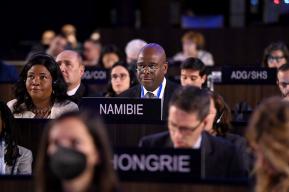Article
Journalists and Whistleblowers: A dynamic relationship to fight corruption

The Issue Brief examines the relationship between journalism and whistleblowers as mutually beneficial and an important tool to protect human rights, fight corruption, and strengthen democracy. It further contains good practices and recommendations for strengthening protection of whistleblowing by strengthening laws, regulations, technologies, and trainings.
Need to strengthen laws, standards, dialogue and training
The key recommendations of the Issue brief are to promote and strengthen laws and practices that allow protecting the whistleblower’s identity if they choose. Also to strengthen regulations, laws, and practices which allow journalists to keep their sources confidential.
The issue brief also recommends to strengthen and promote technologies that allow whistleblowers to file complaints without revealing their identity and organizations which are specialized in giving legal and other support to whistleblowers before or after their statements.
International standards should be promoted, which oblige States to adopt adequate legislation to advance incentives and avoid negative consequences for disclosures of whistleblower. And legislation should be promoted that prevents unjustified lawsuits against a whistleblower for their statements.
While analyzing the issue, the Issue brief’s author recommends training journalist to advise whistleblowers and that there is a need for an increased dialogue between journalism groups and whistleblowers’ defenders to understand better their roles, responsibilities, and ways to strengthen democracy and the rule of law.
A relationship which deserves attention
To mark the launch and highlight the issue, a special session was organized at the World Press Freedom Day Conference in Punta del Este by Free Press Unlimited and the Regional Office for South America of the Inter American Institute of Human Rights.
In the session, the author of the Issue brief, Eduardo Bertoni, stated that the relationship between whistleblowers and the press was an issue that deserves attention and the launch of the Issue brief should be seen as a starting point for a conversation on how whistleblowing is part of exercising freedom of expression.
Lack of protection
Intervening from the perspective of a whistleblower, Yasmine Motarjemi, Food and Safety Specialist at WHO and former Corporate Food Safety Manager at Nestlé, outlined that whistleblowers lacked adequate protection and faced isolation from their professions, and often from the media and society at large. “Not only food safety, but there is a broad range of areas where media are not paying attention (…) and also the judiciary system”.
Motarjemi explained that for many whistleblowing was not a feasible option because internal reporting often leads to moral harassment, and poses grave risks to one’s career. Furthermore, she said that authorities often fail to follow-up on pertinent issues, and the judicial procedures in cases against big companies or corporations are very lengthy, costly and “unfair”. This needed to be countered.
Need for enhanced protection of sources
Panelist, Maria Teresa Ronderos, Co-founder and director, Centro Latinoamericano de Investigación Periodística, underlined the essential need to protect journalists but also their sources, who are often themselves unaware of the danger of their position. “The protection of the source is not just a matter of the moment you publish. It’s a matter of forever (…) Sources need to be protected all the time.”
“Journalism will not survive, and will not be trusted by society if it does not collaborate with people who know best, including whistleblowers”, said Ronderos.
A key point raised in the discussion was the importance of robust legislation as vital to protect whistleblowers against retaliation and other abuse and that mechanisms for whistleblowers should be framed within the protection and promotion of the international right of access to information and freedom of expression.








